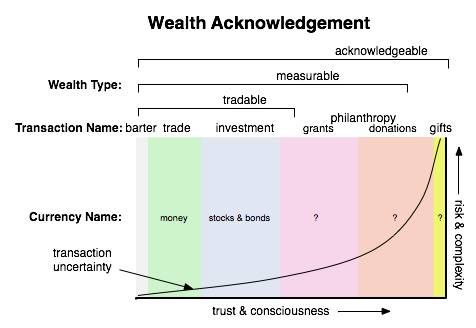Wealth Acknowledgment
When I barter a dozen of my eggs for a pound of your carrots, wealth acknowledgment happens in the act of haggling: It's where we determined how many eggs for how many carrots. When I pay you a coin for your carrots instead (because you don't want my eggs), the coin itself is the acknowledgment of the wealth transfer. The advantage is that the wealth-acknowledgment token, the coin, is redeemable elsewhere in the community. And when communities start using paper notes as wealth-acknowledgment tokens instead of precious metal, the number of transactions is no longer limited by the amount of metal available. When communities invent wealth-acknowledgment tokens for investment, like stock certificates sold by entrepreneurs, they further unlock the potential for growth of wealth.
These examples show how the evolution of wealth-acknowledgment systems prepares the ground for the growth of wealth. They also show how wealth-acknowledgment systems are adopted by communities to reduce their risk in making transactions. Bartering is not risky because the wealth is immediately exchanged, but what if I don't need your carrots? Accepting a token allows me to give without immediately getting wealth in return, because I know I can use the token to get wealth later. Stocks and bonds work similarly in higher-risk situations. Thus wealth-acknowledgment systems evolve in a feedback spiral with social cohesion and trust. They require some level of trust and cohesion to function, but they generate much greater cohesion and trust, which allows new wealth-acknowledgment systems, and the loop continues.
Grant-making, endowments, charitable trusts, and donations (what we call philanthropy), are all efforts to increase measurable or acknowledgeable wealth. Organizations that seek to increase measurable and acknowledgeable wealth in communities almost always suffer from the lack of money. To increase our ability to cultivate these levels of wealth, we need a wealth-acknowledgment system that moves beyond money.
Why do we need open money?

- Modern money is inefficient and unfair. Because communities cannot create their own currencies they are beholden to, and fundamentally controlled by, whoever does, just as users of coins were limited by the amount of precious metal available. When communities can create their own currencies, they don't have to export their own wealth to get money to use for trade. They can start trading right away and export later if they so choose.
- "Money can't buy me love." The structure of the modern monetary system is based on assumptions of competition & resource scarcity. Though these assumptions can be applied to tradable wealth, they blind us when we apply them to only measurable or acknowledgeable wealth. To cultivate the kinds of wealth that correspond with overall systemic health and inter-system resonances, where the assumptions of scarcity and competition no longer apply, we need a new wealth-acknowledgment system.
- Our culture and our planet are falling apart. Humanity has grown so large and complex that cultural systems that once maintained the health of our communities no longer can. Similarly, the effects of humanity on the planetary ecosystem are beyond the ecosystems capacity to self-repair. Humanity must take responsibility itself, but currently has no tool and no capacity sufficient to the need for collective action.